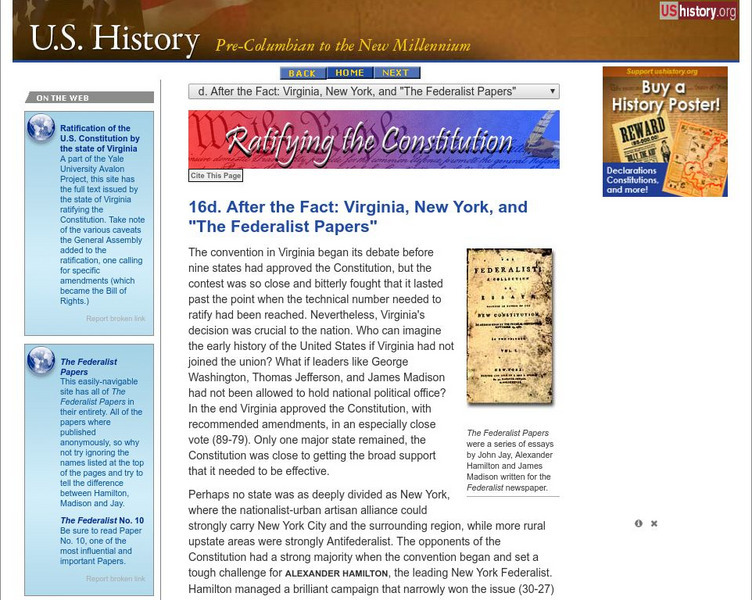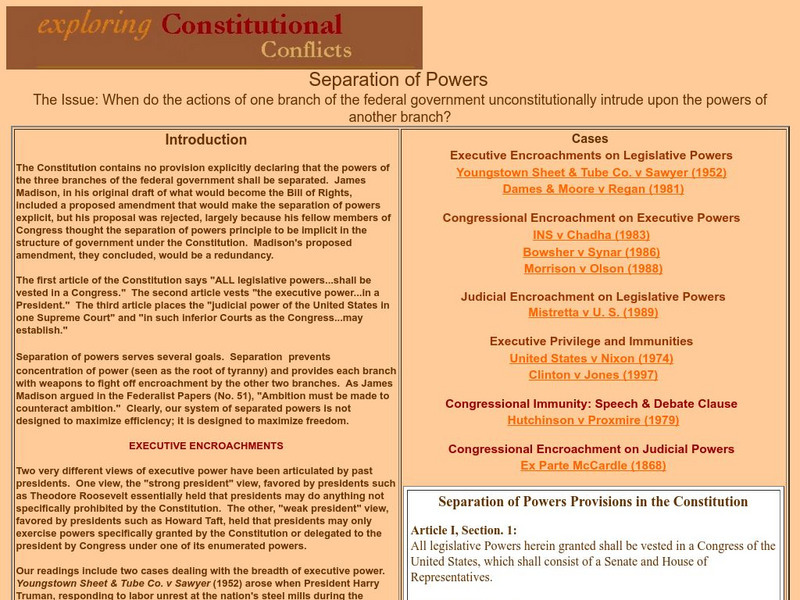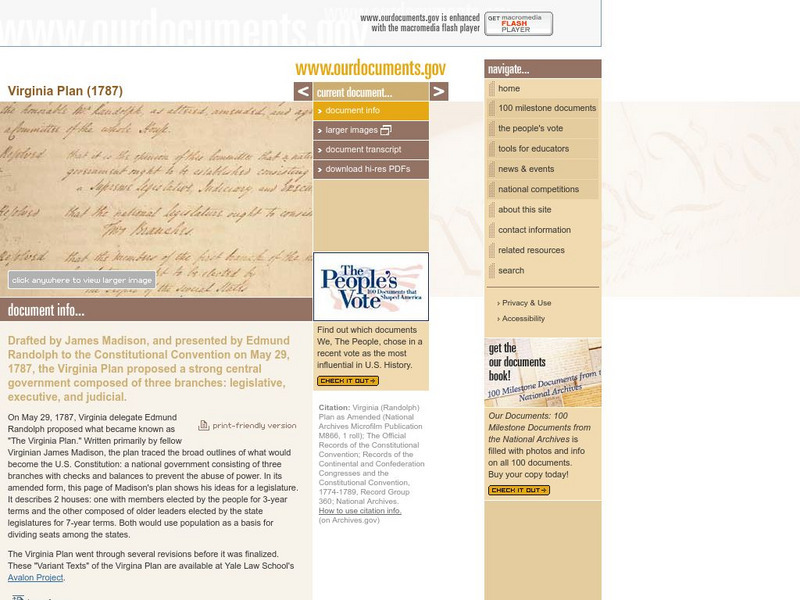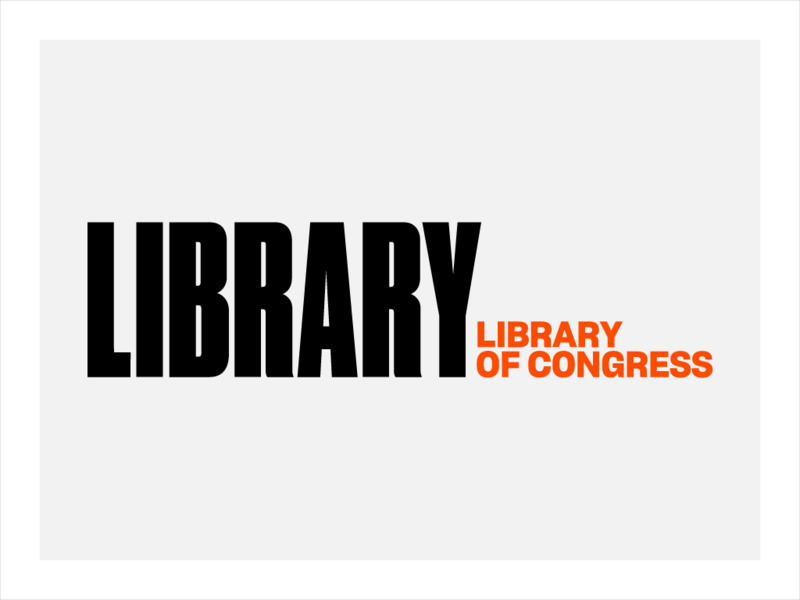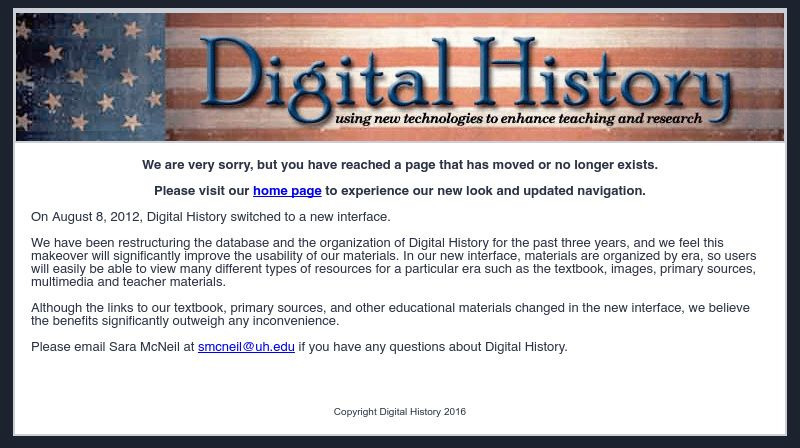US Government Publishing Office
Ben's Guide to u.s. Government: Learning Adventures: Three Branches of Government
Learning adventure guide on the three branches of government. Students read about the functions of the Legislative, Judicial and Executive branches and then play the learning game.
Independence Hall Association
U.s. History: After the Fact: Virginia, New Yok, and "The Federalist Papers"
Read about the necessity for Virginia and New York to support the ratification of the Constitution. See what influenced the vote in Virginia and how the legislature of New York was finally convinced.
US National Archives
National Archives: The Constitution in Action: Article Ii
This activity can be used during a unit on the U.S. Constitution. Students will analyze the Senate Journal of the First Congress and identify how the document demonstrates content contained within Article II of the Constitution in...
The Dirksen Congressional Center
Congress Link: Lesson Plans
The Dirksen Congressional Center provides abundant lesson plans on all aspects of the US Congress and the US Constitution. All lessons contain time frames, objectives, and links to material, and are built around Bloom's taxonomy.
University of Missouri
Exploring Constitutional Conflicts: Separation of Powers
When do the actions of one branch of the federal government unconstitutionally intrude upon the powers of another branch? This article surveys the history of this question in historic Supreme Court cases.
US National Archives
Our Documents: Virginia Plan (1787)
Read the complete text of the Virginia Plan that proposed a strong central government consisting of three branches. You can also view images of the original drafts.
iCivics
I Civics: Three Branches
A web quest looking at how a law gets passed as it moves through the three branches of the United States government: executive, legislative, and judicial. Each page has a question to answer, and a link to a site with information specific...
C-SPAN
C Span Classroom: Teaching About Gridlock
Learning module and lesson plan with C-SPAN video resources and related articles for students to examine and deliberate on whether or not the President should exercise executive powers during times of Congressional gridlock.
iCivics
I Civics: Constitutional Principles
The Founding Fathers created a government based on a set of fundamental principles carefully designed to guarantee liberty. This lesson lets students look at the Constitution from the perspective of its foundational principles and make...
Other
A Republic, if You Can Keep It
An essay by U.S. Congressional Representative Ron Paul of Texas on the state of the American republic delivered at the dawn of the twenty-first century. He argues for the strong separation of powers among the three branches of government...
Library of Congress
Loc: The Constitution: Counter Revolution or National Salvation
Using primary texts and prior study of Colonial America and the Revolution, young scholars examine "what type of government would best represent the ideals of the American Revolution." Worksheets, discussions, and role-playing within...
Digital History
Digital History: Completing a Final Draft
Read about the committee that produced a final draft of the Constitution to present to the entire Constitutional Convention. Find out what the delegates to the convention kept in the final draft and what they changed.
PBS
Pbs Teachers: Advice and Consent: Supreme Court Nominations (Lesson Plan)
A lesson that explains the role of checks and balances in U.S. system of government. Students will describe the process of selecting justices for the Supreme Court, will examine past Supreme Court cases, and will discuss how the Supreme...
National Endowment for the Humanities
Neh: Edsit Ement: The First Amendment
This resource presents lessons on the First Amendment. It contains many resources for use with children, and links to primary source documents.



